Poor Girl Suffering From C-PTSD Gets Kicked From Vacation By Her Friends For Bringing Her Support Dog
This story posted on Reddit's "Am I The Asshole" page got our nerves going, and it's probably going to get your blood boiling too. Take a deep breath and prepare before you continue scrolling down.
And then, get ready to feel better about the whole situation because the people of Reddit are always there with their clever and encouraging comments. That's exactly what you need after something like this happens to you.
The story is about a poor girl and her dog getting voted off a vacation by her "friends." This sentence makes it sound like the girl must have done something horrible to deserve this, but if you keep reading, you'll see that's not the case.
This girl suffers from C-PTSD (Complex Post-Traumatic Stress Disorder) and extreme night terrors, which make sleeping a nightmare for her. This all led to her getting a support dog, Lucy, a few years ago to help her fall asleep.
Ever since she got Lucy, the original poster (OP) has had no issues with her night terrors. All of her friends knew about Lucy, so she didn't see any issue with bringing her along for the vacation in the mountains.
But that is what would cause all of the problems on this vacation. The guy who planned this entire trip has a girlfriend who's allergic to dogs, but no one told him that Lucy was coming.
After they all gathered in the cabin, they realized that they had a huge problem on their hands. The vacation quickly turned into an episode of Survivor as the group voted to send Lucy and the girl home.
It might sound like we're lying, but just scroll down, and you can read the entire story.
The story starts off with no issues, a big group of friends gathering in a cabin in the woods.
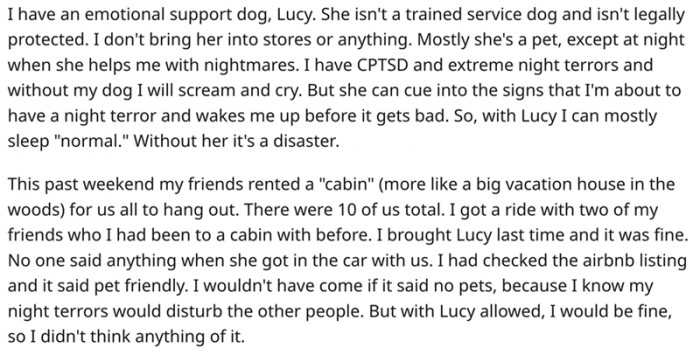
The problem became clear when they got to the cabin and realized one of the girls there was allergic to dogs.
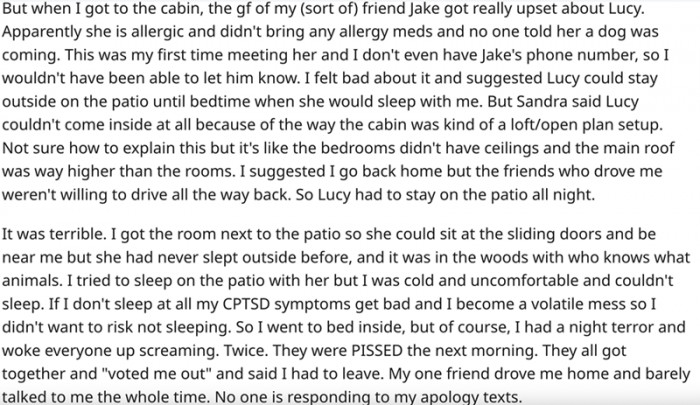
The poor girl had to sleep without her support dog, Lucy, which caused her to wake up screaming in the middle of the night because of her night terrors.
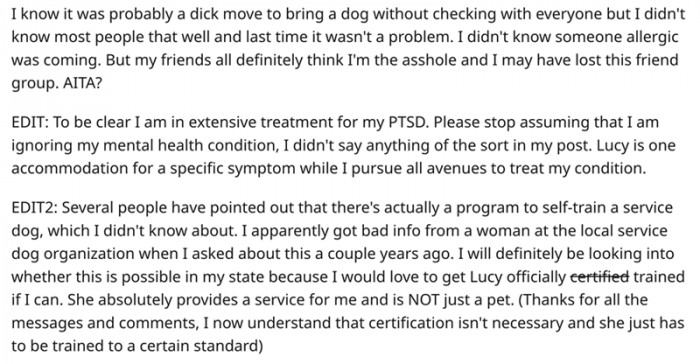
The Role of Support Animals
Support animals have been shown to provide significant emotional and psychological benefits for individuals dealing with trauma and anxiety. Research published in the Journal of Psychosocial Nursing and Mental Health Services indicates that the presence of a support animal can help reduce symptoms of Post-Traumatic Stress Disorder (PTSD) by lowering cortisol levels and providing a sense of safety and companionship. For individuals with Complex PTSD (C-PTSD), which often involves chronic trauma and attachment issues, the bond with a support animal can be particularly crucial in facilitating emotional stability and recovery.
However, the social dynamics at play can complicate these benefits, especially if friends or peers do not understand the importance of these animals to the individual’s mental health. This situation underscores the need for greater awareness and education about mental health issues and the role of support animals in therapeutic settings.
It’s vital to acknowledge the interplay between trauma, social dynamics, and personal recovery. According to Dr. Judith Herman, a psychiatrist and trauma expert, the process of recovery from trauma often involves rebuilding connections and trust, which can be significantly hindered by unsupportive social environments. Individuals with C-PTSD often struggle with feelings of alienation, especially when their coping mechanisms—like the use of support animals—are not recognized or respected by peers.
To foster healthier interactions, individuals are encouraged to educate their friends about their conditions and the importance of their support systems. This can include sharing research about C-PTSD, attending workshops together, or even inviting friends to join therapy sessions when appropriate. Such proactive steps can enhance mutual understanding and strengthen the bonds of friendship, ultimately contributing to better mental health outcomes.
The girl posted updates to the story multiple times, where she made the situation clear as day. There is really no reason to bash this poor girl, as she did nothing wrong.
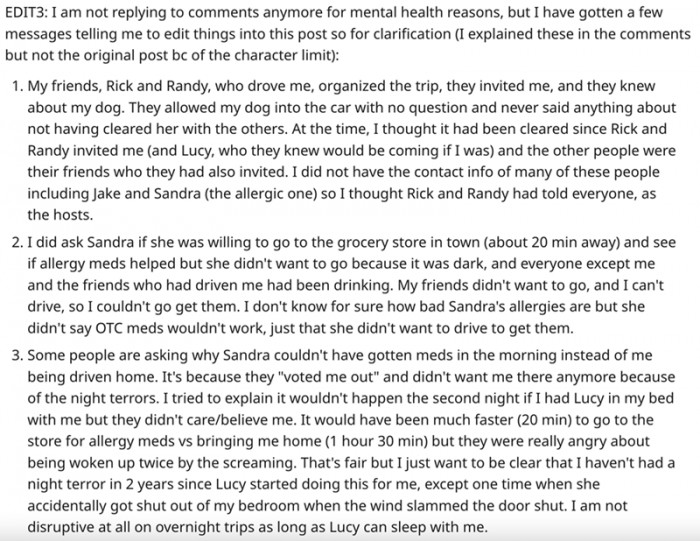
The people of Reddit couldn't believe what this girl's "friends" did to her.
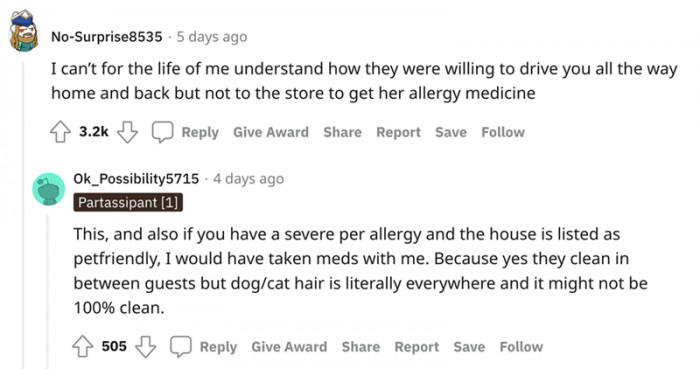
Thank you, Amy, for the keen observation.
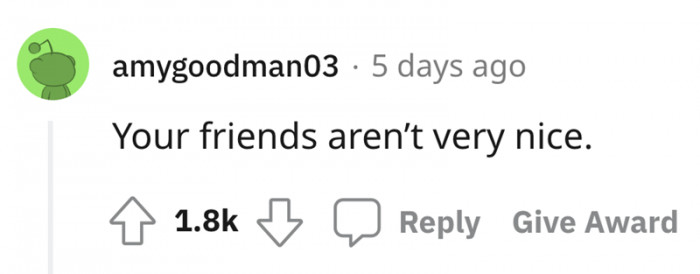
The situation described reflects significant implications regarding social support and friendship dynamics, especially for those dealing with C-PTSD. Social support is a critical buffer against the negative effects of psychological distress, as evidenced by research conducted by Dr. Sheldon Cohen from Carnegie Mellon University, which found that individuals with robust social networks experience lower rates of depression and anxiety. When friends dismiss or invalidate the needs of someone with a mental health condition, it can exacerbate feelings of isolation and trauma, which is counterproductive to healing.
Consequently, fostering environments of empathy and understanding is essential. Friends should ideally engage in open discussions about mental health and be encouraged to educate themselves about C-PTSD, including its symptoms and the role of support animals. This approach can help create a more supportive and inclusive social network.
As the story unfolds, it turns out pretty much everyone knew about the dog except the allergic girl.
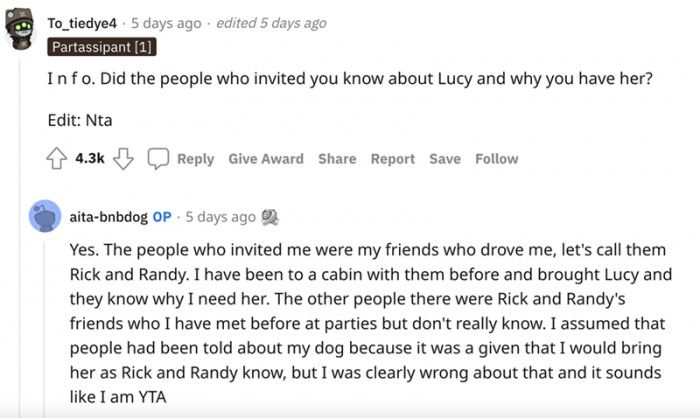
Sure, this girl could have done more, but there's no way you could blame her for all this.
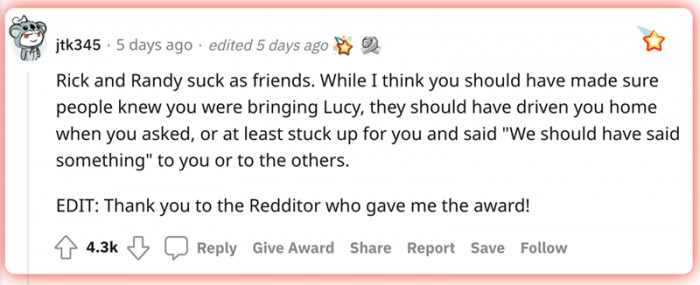
I think everyone agrees that this girl needs some better friends.
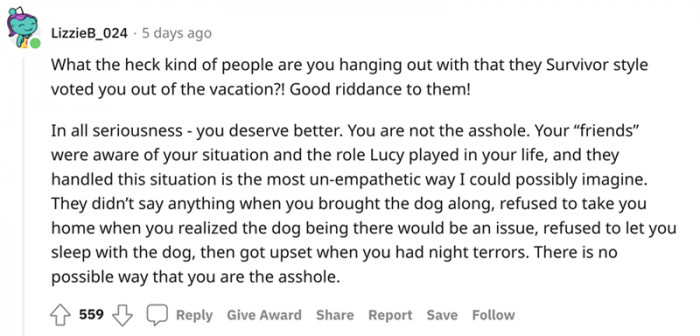
Friendship and Mental Health
Research has shown that friendships play a vital role in mental health, particularly during challenging times. According to a study published in the Journal of Happiness Studies, positive friendships can improve emotional resilience and buffer against the effects of stress. This is particularly relevant in cases of C-PTSD, where individuals often struggle with trust and vulnerability due to past traumas. If friends are unable to provide understanding and support, it can lead to further psychological distress, reinforcing feelings of inadequacy and loneliness.
To mitigate these effects, it's essential for individuals to assess their social circles critically and seek relationships that are affirming and supportive. Therapy can also be a valuable resource for individuals to develop interpersonal skills and learn how to advocate for their needs within friendships. Dr. John C. Norcross, a leading expert in psychotherapy, emphasizes that understanding one's needs and communicating them clearly can lead to healthier relationships.
Everyone deserves to be surrounded by compassionate and understanding people.
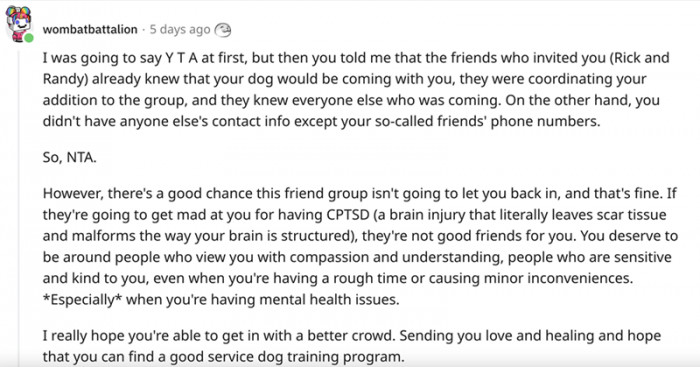
It's hard to believe that people would do something like this to a friend or even a stranger. There were plenty of different ways to handle this that didn't include kicking someone out like this.
We hope this girl finds some better friends because no one deserves to be treated like this.
Psychological Analysis
This situation is a stark reminder of how crucial understanding and empathy are, especially when it comes to mental health issues like C-PTSD. The girl's friends didn't grasp how vital her support dog was for her well-being, highlighting a need for more education around mental health and the role of support animals. It's also a powerful lesson in how our actions can unintentionally exacerbate someone's distress, especially if their coping mechanisms are dismissed or misunderstood.
Analysis generated by AI
Research-Based Understanding
In summary, the experiences of individuals with C-PTSD highlight the critical importance of social support and understanding in the recovery process. According to Dr. Ramani Durvasula, a clinical psychologist, "Supportive relationships are vital for healing from trauma, as they provide the safety and understanding necessary for recovery." Furthermore, Dr. Martin Seligman, the founder of positive psychology, emphasizes that "a strong social network can significantly enhance resilience and facilitate healing." With appropriate education and open communication, friends can learn to better support those with mental health challenges, creating a more inclusive and empathetic community.



